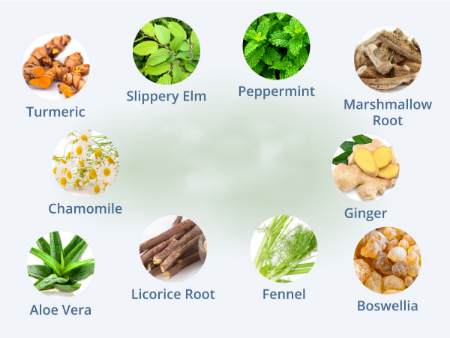It is very normal to experience problems related to gut health in summer due to factors such as high temperatures, changes in diet, increased outdoor activities and dehydration. The high heat of summer can cause food to spoil faster and bacteria to grow, increasing the risk of getting sick from eating contaminated food. Additionally, people tend to consume more cold and sugary drinks, which can throw off the balance of gut bacteria. Home remedies can help manage these problems. Join us as we introduce a list of home remedies that can help improve your gut health this summer.
By incorporating these natural remedies into your daily routine, you can support and strengthen your gut health throughout the summer months. These methods are most effective when included in a balanced diet and healthy lifestyle.

10 home remedies to deal with intestinal problems in summer:
1. Buttermilk:
Buttermilk is a probiotic-rich drink that helps maintain a balance of beneficial gut bacteria, which is essential for proper digestion. Mix a glass of buttermilk with a little salt and roasted cumin powder. Drink it cool, preferably after a meal, to aid digestion and cool the bowels.
2. yogurt:
Yogurt is rich in live probiotics that strengthen the intestinal flora, improve digestion and strengthen the immune system. Consume a bowl of plain yogurt daily. You can also add fruit or a little honey to it for more flavor and benefits.
3. Ginger tea:
Ginger is known for its anti-inflammatory properties that help reduce bloating, gas, and other digestive issues. You can boil a small piece of fresh ginger in water for 5-10 minutes. Strain and add a little honey or lemon for a better taste.
4. Mint tea:
Peppermint contains menthol, which relaxes the muscles of the digestive tract and relieves symptoms of irritable bowel syndrome (IBS) and indigestion. Try steeping some fresh or dry mint leaves in hot water for 5 to 10 minutes. Strain and drink it hot or cold.
5. Aloe Vera juice:
Aloe vera juice has anti-inflammatory properties that soothe the digestive system and promote regular bowel movements. You can extract fresh aloe vera gel and mix it with water or juice. For best results, consume ¼ glass of aloe vera juice in the morning on an empty stomach.
6. Fennel seeds:
Fennel seeds have anti-spasmodic and carminative properties that help reduce bloating, gas and abdominal cramps. For better gut health, chew a teaspoon of fennel seeds after meals. You can also soak the seeds in hot water for 10 minutes, strain and drink as a tea.
7. Papaya:
Papaya contains an enzyme called papain that helps digest protein and reduces constipation and bloating. Eating a bowl of fresh papaya daily can significantly improve your gut health. You can also add papaya to a delicious smoothie.
8. Lemon juice:
Lemon juice helps stimulate the production of digestive enzymes and bile and plays a role in the process of food digestion and liver detoxification. Squeeze half a lemon in a glass of warm water. Drink it first thing in the morning on an empty stomach.
9. Chamomile tea:
Chamomile tea has anti-inflammatory and anti-spasmodic properties that help soothe the digestive system and reduce the symptoms of indigestion. Steep chamomile flowers in hot water for 5 to 10 minutes. Strain and drink it warm, especially before bed.
Note: These treatments are most effective when included in a balanced diet and healthy lifestyle.
Simple tips to prevent intestinal problems in summer
Summer, with its excruciating heat, can cause various digestive problems such as food poisoning, diarrhea and vomiting. To prevent these problems and maintain the health of the digestive system this season, you can take simple measures:
1. Drink plenty of water: In the heat of summer, drink water regularly, even if you don’t feel thirsty. Dehydration is one of the most important causes of digestive problems.
2. Eating healthy foods: Avoid eating raw or undercooked foods, especially meat, chicken, and eggs. These foods are more susceptible to spoilage and growth of microbes.
3. Washing hands: Before eating and after using the toilet, wash your hands thoroughly with soap and water. This work prevents the transfer of microbes to the body and digestive diseases.
4. Avoid spoiled food: Avoid eating food that has expired or looks spoiled.
5. Cook foods thoroughly: Cook meat, poultry, and eggs thoroughly to ensure they are fully cooked.
6. Use washed fruits and vegetables: Wash fruits and vegetables thoroughly before consumption.
7. Use ice: When traveling, use ice to keep food and drinks cool.
8. Avoid pools and polluted waters: Avoid swimming in pools and polluted waters.
9. Taking probiotics: Taking probiotics as a supplement or through foods like yogurt and kefir can help strengthen the digestive system and prevent digestive problems.
10. Stress management: Stress can significantly affect the health of the digestive system. To manage stress, you can use methods such as yoga, meditation or deep breathing.
By following these simple tips, you can largely prevent digestive problems in summer and enjoy this hot season.

Frequently asked questions about intestinal problems in summer
1. What factors can cause intestinal problems in summer?
Heat: Heat can lead to dehydration, increased sweating, and changes in eating habits, all of which can lead to intestinal problems such as diarrhea, constipation, and bloating.
Changes in diet: In summer, people tend to eat more outdoors and may regularly eat raw or undercooked foods, which increases the risk of food poisoning.
Physical activity: Physical activity in summer can cause sweating and dehydration, which can lead to intestinal problems.
Stress: Stress can affect digestive health and cause problems such as diarrhea, constipation and abdominal pain.
2. What are the symptoms of intestinal problems in summer?
Diarrhea: Diarrhea means passing loose and watery stools three or more times a day.
Constipation: Constipation means passing hard and dry stools less than three times a week.
Flatulence: Flatulence means a feeling of fullness in the stomach.
Abdominal cramps: Abdominal cramps mean pain or spasms in the abdomen.
Nausea and vomiting: Nausea and vomiting can be symptoms of food poisoning or other digestive problems.
3. Is ulcerative colitis more common in summer?
Ulcerative colitis is an inflammatory bowel disease that can cause abdominal pain, diarrhea, constipation, and other digestive problems. Some evidence suggests that symptoms of ulcerative colitis may worsen in the summer. This may be due to increased heat, sweating, and dehydration, which can cause stress in the body and aggravate the symptoms of ulcerative colitis.
4. Can probiotics help prevent intestinal problems in summer?
Probiotics are live bacteria that have health benefits for the gut. Some studies have shown that taking probiotics can help reduce symptoms of diarrhea, constipation, and other digestive problems. Although more research is needed, taking probiotics is generally safe and may be useful as a preventative measure for summertime gut problems.
5. When should you see a doctor?
If you have severe or persistent bowel problems such as bloody diarrhea, severe abdominal pain, or fever, you should see your doctor. These symptoms may indicate a more serious illness.
Summary
With the arrival of the summer season, the heat of the air and changes in diet and lifestyle can cause various digestive problems such as diarrhea, constipation, bloating and food poisoning. By following simple tips such as drinking plenty of water, washing your hands regularly, cooking foods thoroughly, consuming washed fruits and vegetables, and avoiding spoiled foods, you can largely prevent these problems from occurring.
Also, in case of any digestive problems, you can use simple home remedies like buttermilk, yogurt, ginger tea, mint tea, aloe vera juice, fennel seeds, papaya, lemon juice and chamomile tea. However, it is important to note that if severe or persistent digestive problems occur, you should see a doctor to rule out more serious conditions.
By adopting a healthy diet, a balanced lifestyle, and proper health care, you can protect your digestive health during the summer season and all year round.










